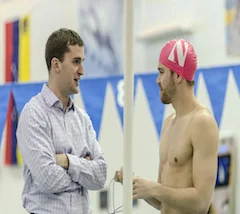Talent: it's a dirty word that we can't get away from in sports. The typical connotation is that talent approximates just how much innate ability a person has for something. People often add redundant qualifiers like "natural talent" or "god-given talent".
The reason, therefore, talent has become a dirty word is the growing sense that one of the most important psychological factors for success in anything is whether you have a "growth" or "fixed" mindset. The work of Carol Dweck (and others) has done much to convince sports people and educators that having a growth mindset, i.e. believing that success in something is possible by developing and nurturing your collective abilities.
in 2014, I sat down with the swimmers I was coaching to define talent, partly because I was growing very frustrated with their definition of it. The exercise was simple, but it did a lot to change their attitudes about how much of "talent" was about fixed traits and how much wasn't.
The List
In all, the swimmers pooled together as many as fifty characteristics they believed could go under the heading "talent". I won't repeat them here. Several different categories emerged.
First came physical skills. "Talented swimmers swim with good technique", they said, and have are good at skills like starts and turns. Talented swimmers knew how to get their hand on the wall first.
Then came physical characteristics. These included height, the length of limbs and lean bodies. Talented swimmers were flexible and had good range of motion.
Mental characteristics made it onto the list. Talented swimmers were confident, specifically in that they believed in their ability to do things. They were "mentally tough" and could shrug off bad performances.
When we were sure that we had a comprehensive list of all the things that "talent" encompassed, I asked them to rate each thing we had written down with a simple binary.
Can you improve it? Or not?
Out of a list of fifty characteristics, we found two that couldn't be improved by some process. You cannot improve your height or the fundamental structure of your body through some process. Everything else is fair game.
Now, no one believes that we are operating on a completely even playing field. There are swimmers out there who could really give their everything and never come close to being world class. But that's not the point! Why focus on the relatively small list of things that you cannot change when there are so many that you can.
Interestingly, I've found that mental characteristics are more often seen as "fixed" by coaches, simply because they have not yet learned the processes for changing and improving these characteristics. However, nearly any of these have a simple process for improvement just like a flip turn, conditioning or freestyle catch
Want to learn more about improving your mindset for performance? Write me!

